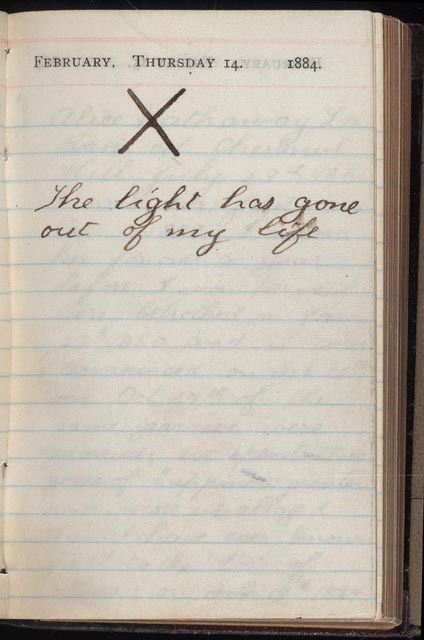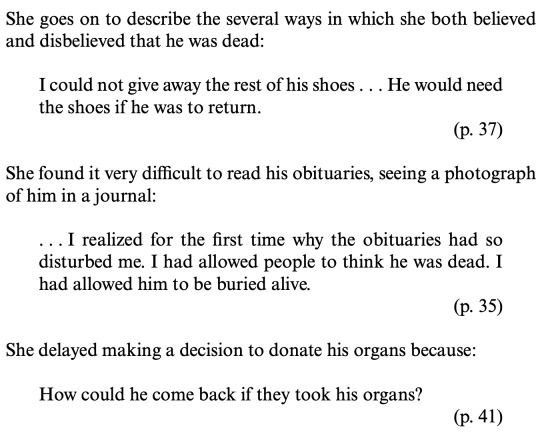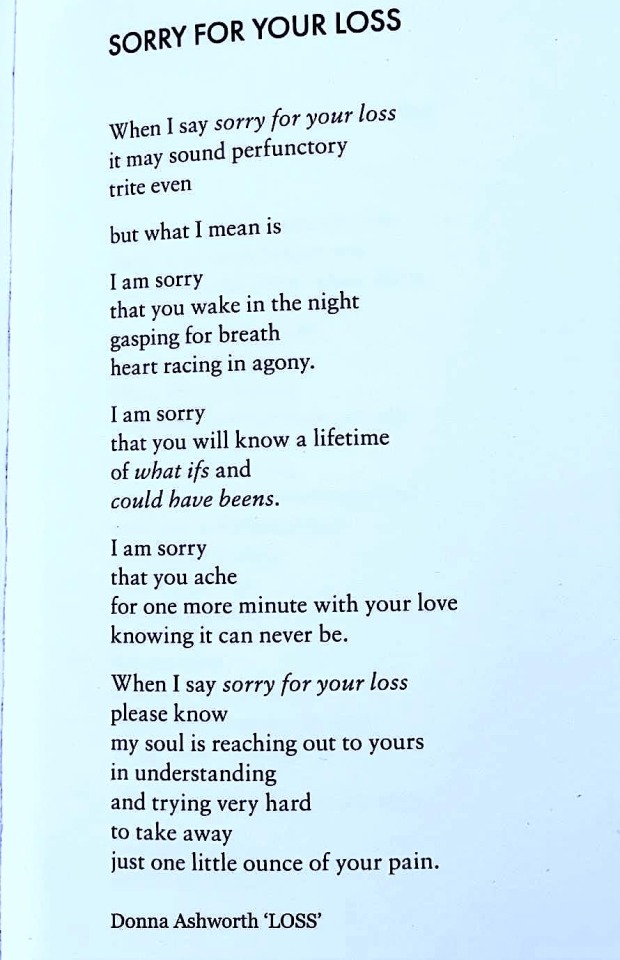#bereavement
Text

Theodore Roosevelt made this entry into his diary on Thursday 14 February 1884 - the day his wife and mother both died!😔💔
1K notes
·
View notes
Text

Colin Murray Parkes, Bereavement: Studies of Grief in Adult Life
513 notes
·
View notes
Text
We're truly sorry to hear about the passing of Christopher Priest. He has been part of Gollancz for many years, and each novel was something new, different and boundary defying. Bethan was with him at Cymera festival last year when he made a rousing speech about science fiction as a battle cry, and a way to change the world for the better. He will be deeply missed, and our thoughts are with his family and loved ones at this time.
138 notes
·
View notes
Text

” The Outside is like a spellbinding transparent membrane.
The Inside is tinged with the black purple color of passion.
I am a pomegranate that's about to burst “
#seras victoria#hellsing ultimate#zorin blitz#hellsing#hellsing ova VII#tw blood#hellsing millennium#bernaseras#vampy girl glow up#hatred#bereavement#gore art#my artwork#mr shimurka#SoundCloud
70 notes
·
View notes
Text
Duncan's seat
Settled upon a dead man’s designated
seat, eating the last meal he probably
would’ve selected for himself before
his unexpected passing (no item that
—
I’m dutifully consuming between acts
has been picked, prepped, nor plated of
my want or choosing) — flanked by
—
our shared loyal constant since youth’s
agony beside my own future’s devotion
and an oblivious stranger celebrating
her birthday — wondering quietly how
—
soon ‘til sweet grief does surely strike us
too-inept mourners like some divinely
driven dagger through laugh-filled chests
29 notes
·
View notes
Text
tw : grief, death of an animal
an hour ago I had to finally say goodbye to my gorgeous cat, who has been the most consistent thing in my life since I was seven years old. We grew up together. I was with her in the room until her last gasp, and a part of me isn’t completely numb, a part of me feels relived. She isn’t in pain anymore, and she’s happy somewhere up in Heaven.
I love you, sweetie <3
24 notes
·
View notes
Text
I understand that people are just trying to comfort me, of course I understand. But I sometimes feel that a resiliently happy and tenaciously optimistic personality aren't all that welcome when I'm going through a lot of grief. I don't know if I'm really "ready" to feel better. If that even makes sense. I feel like my body hasn't really processed everything that's happened and it's more effort to tell my friends to stop trying to put bandages on me than it would be to just pretend I was okay again and just grieve in private. I'm not sure what to do with it just yet ig :/
#rambles#i dont normally put like...vent type thoughts on my blog but i genuinely dont know what to think rn#im having trouble talking about my feelings on grief with people one to one bc of aforementioned optimism#my friend died recently and I dont know what to do w myself#i have so much responsibilities right now bc I'm graduating soon#and i have a lot of people relying on me to get my work done#it feels rude to him and his memory that im not missing a beat to sit and think of him#I'm just having to get back to it and put off his death until I have the time for it#i know that's so bleak but it's where I'm at rn#not sure how to trigger tag this?#bereavement#death
75 notes
·
View notes
Text
to the world you were just a part
to us you were the world
only goodnight darling, not farewell.
~ an inscription i once saw on a grave
12 notes
·
View notes
Text

Doctor Beverly Crusher
@SpaceDocMom
My medical technology can't bring anyone truly dead back to life for you, but I can sit with you and listen to your stories about them which keeps them going in our hearts a little while longer. emojis: black heart, blue heart, masked
1:30 PM · Oct 6, 2023
#star trek#doctor crusher#star trek the next generation#star trek memes#star trek tng#support#kindness#care#compassion#bereavement#mourning#love#loss
30 notes
·
View notes
Text
And Alexander Wept for Hephaistion....
If you don’t mind, I wanted to ask, you said something along the lines of: by the time Alexander was coming closer to his death, he had recovered from the grief of Hephaistion’s death (if I’m remembering this correctly; I’m so sorry I have a fuzzy memory) how long do you think he mourned Hephaistion?
------------------
This was an ask via message, so putting it here to reply publicly, as it may be of interest to others.
First, however, I want to mention a pair of articles I wrote many years ago now, but which are still valid:
“The Mourning of Alexander the Great,” Syllecta Classica 12 (2001), 98-145.
“Some New Thoughts on the Death of Alexander the Great,” with Eugene N. Borza (lead author), The Ancient World 31.1 (2000), 1-9. (I wrote the last 1/3 of it.)
The first, in particular, is an in-depth analysis of Alexander’s behavior after Hephaistion died. I’m still rather proud of it, as it brings together two quite diverse fields: bereavement + Alexander studies. If I had a critique for it now, it’s that I didn’t analyze the stories inherent in the primary sources, but that also wasn’t my intention in writing it. I specifically say that I do not plan to pick apart which reports of Alexander’s behavior are likely authentic and which aren’t. My goal was to evaluate all of them in terms of possible evidence of pathological bereavement, according to the (then) DSM III-R (et al.).
TL;DR version of the article: Alexander’s mourning was NORMAL and followed recognized patterns, if one allows for the loss of someone extremely close, a spouse/similar.
Yes, there were complicating factors. BUT he did not go crazy with grief.
Unfortunately, this article is far less known than the “An Atypical Affair” article on Alexander and Hephaistion’s relationship. That’s too bad, as the “His grieving was extreme!” persists among even some of my colleagues, never mind those outside the field of Macedoniasts. (It’s also admittedly possible that they were simply unconvinced by my arguments, but in that case, one usually cites and says so.)
If I could put a giant blinking neon light on one of my earlier articles to get it more attention, that would be the one I’d point to.
The second article—or my 1/3rd of it anyway—deals with the possible effects of deep mourning on the immune system of adult males of Alexander’s age group. Yes, according to some limited research, it does have an impact that increases susceptibility to infectious disease. Add his poor overall physical health after all those battles (and Macedonian-style symposial drinking), and he was just too spent to fight off the typhoid or malaria or whatever fever disease got him.
Ergo, he died roughly 8 months after Hephaistion. We don’t have a date for the latter’s death, but sometime in October or November of 324 BCE is the window. Alexander died June 10th, 323 … or possibly a day or so later if he were in a paralysis too deep for his breathing to be ascertained. (As per Gene’s part of the article.)
The dating is important, as it affects where he (probably) was in his mourning process.

Mourning follows a somewhat predictable pattern, and one of the biggest mistakes made by those unfamiliar with human mourning is to underestimate (often by a lot) just how long mourning takes … even perfectly normal, healthy mourning.
For a major loss, main mourning takes up to a year. No joke. That’s why bereavement counselors try to keep the bereaved from making any permanent decisions within that year. They’re still very much being buffeted by the winds of grief, even if they want to pretend they aren’t. But even after the year anniversary—and marking it with some sort of formal ceremony helps!*—mourning continues off-and-on (sometimes really intense for a few hours or even a few days) for up to 5 years. Again, no joke. Some bereavement studies experts don’t really consider a person truly recovered (note I never say “over it”) for as long as 10 years.
Additionally, ANY deep loss triggers mourning; it doesn’t have to be death. A divorce will result in mourning, even if the people in the marriage wanted to divorce. It’s still a “death” of sorts. Moving some distance away, graduation, and retirement can all set off mourning. This surprises people, that mourning can attach even to “happy” circumstances. Anything that includes an ending will set off mourning, albeit it may not be that intense.
But THE #1 and #2 most devastating losses are the loss of a child and the loss of a spouse/spouse-like figure. Period.
So, a slight correction to the question, I didn’t say he’d recovered from his mourning, but that he was beginning to emerge from the deepest parts of mourning.
What do I mean by that? There are (roughly) 3(-4) major phases of mourning. The speed at which we pass through these varies, dependent on the type of death and our closeness to the deceased. (The first article goes into that in more depth.)
Shock phase, which is typically anywhere from a few days to about 2 weeks.
Deep mourning phase, where the bereaved must come to terms with the loss. The bereaved cycles through a series of stages (not the best term) and, more importantly, struggles with certain TASKS of mourning (as per Worden). Again, the length of this phase can vary, but for serious losses, it can take up to 8-9 months, with the worst of it usually hitting 3-6 months. There is an intense focus on the deceased and the bereaved person may want little to do with new people and vacillate between wanting to talk a lot about the deceased or wanting to give away all their stuff because it’s too painful. Anger, bargaining, depression, self-blame … all are typical of this phase. It’s INTENSE. It really does take months, and people routinely underestimate it.
Re-emergent phase, where the bereaved begins to take an interest again in the external world, may make new friends and new plans that don’t involve the deceased. The deceased is far, far from forgotten, but the bereaved is learning to live without the dead person.
Continued bereavement would be a fourth phase past the one-year anniversary, where the bereaved will still experience grief, sometimes very intense when triggered by a particular memory, a birthday, or anniversaries. But the overall “worst” part of mourning is past.
Finally, especially in the deepest part of mourning, the depression felt by the bereaved is on par with clinical depression, but (except for rare cases) the bereaved absolutely should not take or be prescribed antidepressants as these interrupt the mourning process.
Yes, it hurts like hell but one can only go through, not over, around, or under. Through.
In some cases, however, bereavement becomes “complicated,” resulting in what’s referred to as pathological bereavement, by which I mean only not normal (I wouldn’t even say abnormal). Sudden death (as with Hephaistion) IS one factor that can complicate mourning, but it doesn’t necessarily lead to full-blown pathological grief. In the article, I evaluate all Alexander’s listed behaviors and explain why my final conclusion is that his bereavement was sharp, but not pathological.
Alexander’s behavior in the last few months showed aspects of the third phase. He was planning (or probably returning to planning) his next campaign and thinking about improvements to the city of Babylon apparently with the intention of making it his eastern capital. Yes, he was also planning Hephaistion’s funeral, but the other two things were new and show re-engagement.
So Alexander’s mourning had not ended before he died himself, only shifted. Even if he’d lived another 5 years, he’d still have experienced bereavement off and on.
Remember, grieving takes TIME. More time than you expect.
If you know someone going through grief, especially for a family member, beloved, or very close friend … give them space. Let them cry. Encourage them to talk about the lost person if they want to, but don’t force it if they don’t want to. Don’t argue with their theology/beliefs about death or their gallows humor, but also don’t shove your theology/beliefs about death, or your gallows humor, onto them. Read the room.
MOST OF ALL, JUST BE PRESENT. It matters less what you say than that you’re there. They may not even remember what you say later; they will remember you showed up.
—————-
* In fact, world cultures that have traditional, one-year anniversary ceremonies routinely show better outcomes for mourning individuals.
#asks#Alexander the Great#Hephaistion#Hephaestion#death of Hephaistion#death of Hephaestion#Mourning of Alexander the Great#bereavement#mourning#tasks of mourning#stages of grief#Alexander the Great's grief#alexander x hephaestion#alexander x hephaistion
12 notes
·
View notes
Text

Joan Didion in Colin Murray Parkes, Bereavement: Studies of Grief in Adult Life
203 notes
·
View notes
Text
Hiatus
Due to a recent bereavement in my family, I'll be taking a brief hiatus from the self shipping community.
I'll still be around, just not as active.
Thanks.

9 notes
·
View notes
Text
I have already lost my mother, father, last grandparent, my cousin, and countless beloved pets all before I even reach 27 and with that, sometimes I find myself wondering why we as humans even bother loving that of which will eventually die and be gone.
But the simple and hard truth is that it IS still better to have loved and lost than to have never loved at all. Because yes, the pain never really lessens but neither does the love. The love never fades either, in fact, you might even find it only ever grows.
#personal#mental health#mental health journey#healing#mental health reminders#gentle reminders#self love#self care#selfcare#griefrecovery#tw grieving#tw grief#grieving#grief#cw grief#cw grieving#moving on#letting go#bereavement#love#grief recovery#trauma recovery#cw trauma#tw trauma#recovery
64 notes
·
View notes
Text

On August 17, 1941, an estimated 10,000 Harlem residents showed up at the 132nd Street pier of the Hudson to board a boat for an excursion to Bear Mountain. The vessel could only accommodate 3,100, however, and in the resulting stampede, some people were killed. This woman had just seen the body of a relative.
Photo: Murray Becker for the AP via the Denver Post
#vintage New York#1940s#Murray Becker#stampede#vintage Harlem#tragedy#August 17#17 August#17 Aug.#Aug. 17#grief#bereavement#hysteria
37 notes
·
View notes
